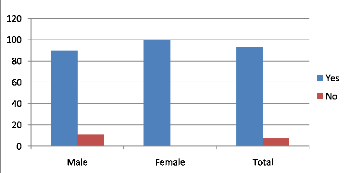CHAPTER FOUR: DATA PRESENTATION, INTERPRETATION AND
ANALYSIS
4.0 Introduction
This chapter presents, categorizes, interprets and analyses
the data that was gathered using the questionnaire, interview, focus group
discussions, documentary analysis and observation schedules.
Data obtained from the questionnaires were analysed first
using SPSS version 17.0 and presented in the form of frequency tables and
graphs. Some aspects of the data obtained from open-ended questionnaires were
thematically analysed and supported by information obtained through the
focussed group discussion. The second and third sections constitute the bulk of
the findings from interviews, document analysis procedures and observational
schedules, and like the second aspect of the questionnaire were thematically
analysed. In all cases the research themes were addressed. The recommendations
by Aldridge and Levine (2001), were taken into account in the formulation of
the emerging themes that are going to inform the discussion. The themes were
formulated in order to categorize the data.
This chapter begins with, the findings from the questionnaire
followed by a discussion of findings from interviews and documents analysis
procedures and the overview of the existing situation of Gasabo District. The
last part is a summary of findings merging all the findings from the different
data sources, and demonstrating emerging trends here described as key
findings.
4.1 Discussion of questionnaire findings
4.1.1 Questionnaire Administration
|
Total questionnaires administered:
|
40
|
|
Total questions on questionnaire:
|
20
|
|
Total responses:
|
32
|
|
Percentage responses:
|
80%
|
Generally the response rate was quite good (80%) and there was
evidence that both women and men were quite comfortable with interacting with
the questionnaire though in some instances blank responses could not be ruled
out for one reason or the other.
4.1.2 Quali-Quantitative Analysis of Questionnaire Data
Below is a quali-quantitative analysis of questionnaire data.
It is quali-quanti in the sense that both qualitative and quantitative data are
analysed given that the questionnaire itself comprised both objective and
subjective sections. As such objective responses are analysed quantitatively
while descriptive (subjectively) data are analysed thematically.
Note, however, that both types of data, because they are corroborative
in that they are responding to the same question, are therefore treated
simultaneously.

4.1.2.1 Gendered perceptions on poverty as Rwanda's
threat to socio-economic development
Figure 4.1:
Research findings reveal that 85% of all male respondents
supported the idea that Rwanda?s socio-economic development was being
threatened by poverty. Even more female respondents (100%) believe that poverty
is a key threat to Rwanda?s prosperity, a negligible average percentage of
about 5% thinking otherwise.
Some of their typical responses were:



The issue of poverty reduction is of great concern for
Rwanda, as Rwanda has its own policies and efforts made by technocrats.
Poverty impacts negatively on the quality of living standards
of Rwandan.
Poverty lowers production of the productive sector, in
particular small scale enterprises with no savings in the banks hence there is
no bargaining power to get credits from the banks.
Based on the findings, it can be noted that the overall
poverty affects the living standards of citizens and all their aspects towards
economic development. Since the genocide Rwanda has been struggling with fiscal
deficit and her efforts have always been directed towards servicing national
debt which has been accumulating exponentially in spite of foreign aid
(Ministry of Finance statistics Department, 2004:134). MeIZITQEEEEE EaQdEIIIE,
E5 ZEQAVESRYHWEIDe decreased from 60.2% to 56.9% of the population (UNDP,
2007).
This trend has continued despite her macro-economic strategy
to decrease excessive dependence on foreign assistance (ibid). On the other
hand the government of Rwanda has directed most of its resources towards
helping people survive instead of investing in developmental activities which
recapitalize the productive sector of the economy (ibid: 135). The
recapitalization of the productive sector enhances employment opportunities for
the citizens, reducing poverty thereby enhancing socio-economic growth which is
key to the attainment of MDGs.
| 


